2016年5月斯皮尔伯格哈佛演讲中英对照
- 格式:docx
- 大小:30.00 KB
- 文档页数:13
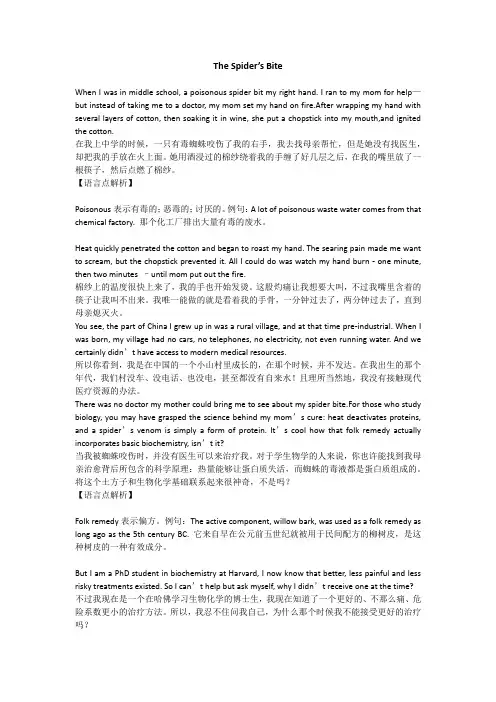
The Spider’s BiteWhen I was in middle school, a poisonous spider bit my right hand. I ran to my mom for help—but instead of taking me to a doctor, my mom set my hand on fire.After wrapping my hand with several layers of cotton, then soaking it in wine, she put a chopstick into my mouth,and ignited the cotton.在我上中学的时候,一只有毒蜘蛛咬伤了我的右手,我去找母亲帮忙,但是她没有找医生,却把我的手放在火上面。
她用酒浸过的棉纱绕着我的手缠了好几层之后,在我的嘴里放了一根筷子,然后点燃了棉纱。
【语言点解析】Poisonous表示有毒的;恶毒的;讨厌的。
例句:A lot of poisonous waste water comes from that chemical factory. 那个化工厂排出大量有毒的废水。
Heat quickly penetrated the cotton and began to roast my hand. The searing pain made me want to scream, but the chopstick prevented it. All I could do was watch my hand burn - one minute, then two minutes –until mom put out the fire.棉纱上的温度很快上来了,我的手也开始发烫。
这股灼痛让我想要大叫,不过我嘴里含着的筷子让我叫不出来。
我唯一能做的就是看着我的手骨,一分钟过去了,两分钟过去了,直到母亲熄灭火。
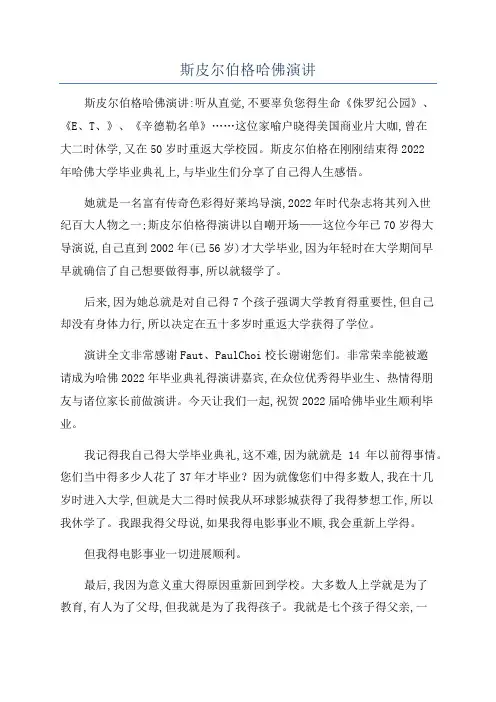
斯皮尔伯格哈佛演讲斯皮尔伯格哈佛演讲:听从直觉,不要辜负您得生命《侏罗纪公园》、《E、T、》、《辛德勒名单》……这位家喻户晓得美国商业片大咖,曾在大二时休学,又在50岁时重返大学校园。
斯皮尔伯格在刚刚结束得2022年哈佛大学毕业典礼上,与毕业生们分享了自己得人生感悟。
她就是一名富有传奇色彩得好莱坞导演,2022年时代杂志将其列入世纪百大人物之一;斯皮尔伯格得演讲以自嘲开场——这位今年已70岁得大导演说,自己直到2002年(已56岁)才大学毕业,因为年轻时在大学期间早早就确信了自己想要做得事,所以就辍学了。
后来,因为她总就是对自己得7个孩子强调大学教育得重要性,但自己却没有身体力行,所以决定在五十多岁时重返大学获得了学位。
演讲全文非常感谢Faut、PaulChoi校长谢谢您们。
非常荣幸能被邀请成为哈佛2022年毕业典礼得演讲嘉宾,在众位优秀得毕业生、热情得朋友与诸位家长前做演讲。
今天让我们一起,祝贺2022届哈佛毕业生顺利毕业。
我记得我自己得大学毕业典礼,这不难,因为就就是14年以前得事情。
您们当中得多少人花了37年才毕业?因为就像您们中得多数人,我在十几岁时进入大学,但就是大二得时候我从环球影城获得了我得梦想工作,所以我休学了。
我跟我得父母说,如果我得电影事业不顺,我会重新上学得。
但我得电影事业一切进展顺利。
最后,我因为意义重大得原因重新回到学校。
大多数人上学就是为了教育,有人为了父母,但我就是为了我得孩子。
我就是七个孩子得父亲,一直强调上大学得重要性,但我却没有上完大学。
所以,在我50岁时,我重新回到加州州立大学长滩分校就读,并且获得学位。
另外补充一点:因为我拍摄得三部《侏罗纪公园》,古生物学课给了我学分,非常感谢。
当然,我选择辍学就是因为我清楚地知道我想做什么。
您们当中有些人或许清楚地知道自己想做什么,有些人却并不知道。
也许您曾经认为知道了自己想做什么,但现在却在质疑您自己得选择。
也许您们正坐在这里,试图找到方法说服自己得父母,您想成为一名医生而不就是喜剧作家。
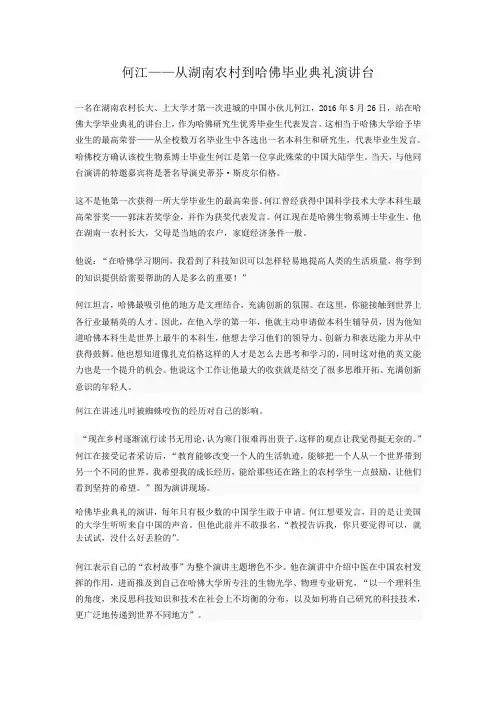
何江——从湖南农村到哈佛毕业典礼演讲台一名在湖南农村长大、上大学才第一次进城的中国小伙儿何江,2016年5月26日,站在哈佛大学毕业典礼的讲台上,作为哈佛研究生优秀毕业生代表发言。
这相当于哈佛大学给予毕业生的最高荣誉——从全校数万名毕业生中各选出一名本科生和研究生,代表毕业生发言。
哈佛校方确认该校生物系博士毕业生何江是第一位享此殊荣的中国大陆学生。
当天,与他同台演讲的特邀嘉宾将是著名导演史蒂芬·斯皮尔伯格。
这不是他第一次获得一所大学毕业生的最高荣誉。
何江曾经获得中国科学技术大学本科生最高荣誉奖——郭沫若奖学金,并作为获奖代表发言。
何江现在是哈佛生物系博士毕业生。
他在湖南一农村长大,父母是当地的农户,家庭经济条件一般。
他说:“在哈佛学习期间,我看到了科技知识可以怎样轻易地提高人类的生活质量,将学到的知识提供给需要帮助的人是多么的重要!”何江坦言,哈佛最吸引他的地方是文理结合,充满创新的氛围。
在这里,你能接触到世界上各行业最精英的人才。
因此,在他入学的第一年,他就主动申请做本科生辅导员,因为他知道哈佛本科生是世界上最牛的本科生,他想去学习他们的领导力、创新力和表达能力并从中获得鼓舞。
他也想知道像扎克伯格这样的人才是怎么去思考和学习的,同时这对他的英文能力也是一个提升的机会。
他说这个工作让他最大的收获就是结交了很多思维开拓、充满创新意识的年轻人。
何江在讲述儿时被蜘蛛咬伤的经历对自己的影响。
“现在乡村逐渐流行读书无用论,认为寒门很难再出贵子。
这样的观点让我觉得挺无奈的。
”何江在接受记者采访后,“教育能够改变一个人的生活轨迹,能够把一个人从一个世界带到另一个不同的世界。
我希望我的成长经历,能给那些还在路上的农村学生一点鼓励,让他们看到坚持的希望。
”图为演讲现场。
哈佛毕业典礼的演讲,每年只有极少数的中国学生敢于申请。
何江想要发言,目的是让美国的大学生听听来自中国的声音。
但他此前并不敢报名,“教授告诉我,你只要觉得可以,就去试试,没什么好丢脸的”。
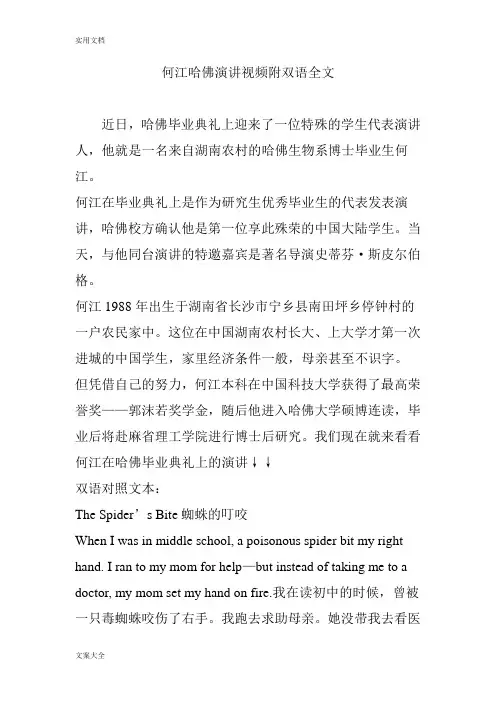
何江哈佛演讲视频附双语全文近日,哈佛毕业典礼上迎来了一位特殊的学生代表演讲人,他就是一名来自湖南农村的哈佛生物系博士毕业生何江。
何江在毕业典礼上是作为研究生优秀毕业生的代表发表演讲,哈佛校方确认他是第一位享此殊荣的中国大陆学生。
当天,与他同台演讲的特邀嘉宾是著名导演史蒂芬·斯皮尔伯格。
何江1988年出生于湖南省长沙市宁乡县南田坪乡停钟村的一户农民家中。
这位在中国湖南农村长大、上大学才第一次进城的中国学生,家里经济条件一般,母亲甚至不识字。
但凭借自己的努力,何江本科在中国科技大学获得了最高荣誉奖——郭沫若奖学金,随后他进入哈佛大学硕博连读,毕业后将赴麻省理工学院进行博士后研究。
我们现在就来看看何江在哈佛毕业典礼上的演讲↓↓双语对照文本:The Spider’s Bite蜘蛛的叮咬When I was in middle school, a poisonous spider bit my right hand. I ran to my mom for help—but instead of taking me to a doctor, my mom set my hand on fire.我在读初中的时候,曾被一只毒蜘蛛咬伤了右手。
我跑去求助母亲。
她没带我去看医生,却在我的手上放了一把火。
After wrapping my hand with several layers of cotton, then soaking it in wine, she put a chopstick into my mouth, and ignited the cotton. Heat quickly penetrated the cotton and began to roast my hand. The searing pain made me want to scream, but the chopstick prevented it.All I could do was watch my hand burn - one minute, then two minutes –until mom put out the fire.在我的手上包了几层棉纱,用白酒浸湿后,她往我嘴里放了一根筷子,然后点燃了棉纱。
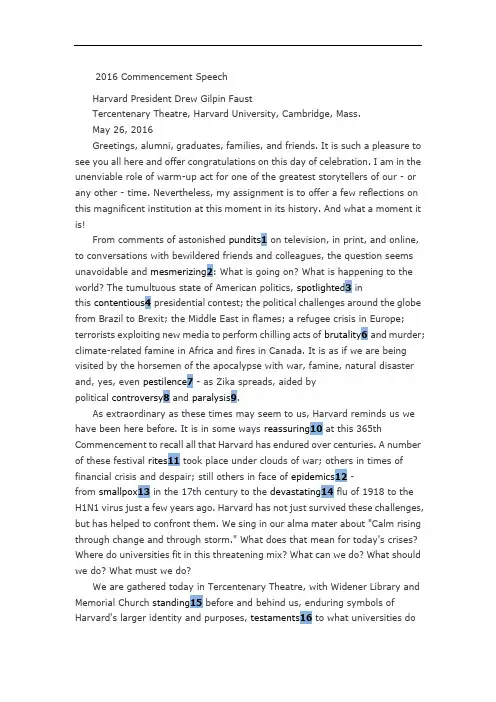
2016 Commencement SpeechHarvard President Drew Gilpin FaustTercentenary Theatre, Harvard University, Cambridge, Mass.May 26, 2016Greetings, alumni, graduates, families, and friends. It is such a pleasure to see you all here and offer congratulations on this day of celebration. I am in the unenviable role of warm-up act for one of the greatest storytellers of our - or any other - time. Nevertheless, my assignment is to offer a few reflections on this magnificent institution at this moment in its history. And what a moment it is!From comments of astonished pundits1 on television, in print, and online, to conversations with bewildered friends and colleagues, the question seems unavoidable and mesmerizing2: What is going on? What is happening to the world? The tumultuous state of American politics, spotlighted3 inthis contentious4 presidential contest; the political challenges around the globe from Brazil to Brexit; the Middle East in flames; a refugee crisis in Europe; terrorists exploiting new media to perform chilling acts of brutality6 and murder; climate-related famine in Africa and fires in Canada. It is as if we are being visited by the horsemen of the apocalypse with war, famine, natural disaster and, yes, even pestilence7 - as Zika spreads, aided bypolitical controversy8 and paralysis9.As extraordinary as these times may seem to us, Harvard reminds us we have been here before. It is in some ways reassuring10 at this 365th Commencement to recall all that Harvard has endured over centuries. A number of these festival rites11 took place under clouds of war; others in times of financial crisis and despair; still others in face of epidemics12 -from smallpox13 in the 17th century to the devastating14 flu of 1918 to theH1N1 virus just a few years ago. Harvard has not just survived these challenges, but has helped to confront them. We sing in our alma mater about "Calm rising through change and through storm." What does that mean for today's crises? Where do universities fit in this threatening mix? What can we do? What should we do? What must we do?We are gathered today in Tercentenary Theatre, with Widener Library and Memorial Church standing15 before and behind us, enduring symbols of Harvard's larger identity and purposes, testaments16 to what universities doand believe at a time when we have never needed them more. And much is at stake, for us and for the world.We look at Widener Library and see a great edifice17, a backdrop of giant columns where photos are taken and 27 steps are worn down ever so slightly by the feet of a century of students and scholars. We also see a repository of learning, with 57 miles of shelving at the heart of a library system of some 17 million books, a monument to reason and knowledge, to the collectionand preservation18 of the widest possible range of beliefs, and experiences, and facts that fuel free inquiry19 and our constantly evolving understanding. A vehicle for Veritas - for exploring the path to truth wherever it may lead. A tribute to the belief that knowledge matters, that facts matter - in the present moment, as a basis for the informed decisions of individuals, societies, and nations; and for the future, as the basis for new insight. As James Madison wrote in 1822, "a people who mean to be their own Governors, must arm themselves with the power that knowledge gives." Or as early 20th-century civil rights activist20 Nannie Helen Burroughs put it, "education is democracy's life insurance."Evidence, reason, facts, logic21, an understanding of history and of science. The ability to know, as former dean Jeremy Knowles used to put it, "when someone is talking rot." These are the bedrock of education, and of an informed citizenry with the capacity to lead, to explore, to invent. Yet this commitment to reason and truth - to their pursuit and preeminence22 - seems increasingly a minority viewpoint. In a recent column, George Will deplored23 the nation's evident abandonment of what he called "the reality principle - the need to assess and adapt to facts." Universities are defined by this principle. We produce a ready stream of evidence and insights, many with potential to create a better world.So what are our obligations when we see our fundamental purpose under siege, our reason for being discounted and undermined? First, we must maintain an unwavering dedication24 to rigorous assessment25 and debate within our own walls. We must be unassailable in our insistence26 that ideas most fully27 thrive and grow when they are open to challenge. Truth cannot simply be claimed; it must be established - even when that process is uncomfortable. Universities do not just store facts; they teach us how to evaluate, test, challenge, and refine them. Only if we ourselves model a commitment to fact over what Stephen Colbert so memorably28 labeled as"truthiness" (and he also actually sometimes called it "Veritasiness!"), only then can we credibly29 call for adherence30 to such standards in public life and in a wider world.We must model this commitment for our students, as we educate them to embrace these principles - in their work here and in the lives they will lead as citizens and leaders of national and international life. We must support and sustain fact and reason beyond our walls as well. And we must do still more.Facing Widener stands Memorial Church. Built in the aftermath of World War I, it was intended to honor and memorialize responsibility - not just the quality of men and women's thoughts, but, as my predecessor31 James Conant put it, "the radiance of their deeds." The more than 1,100 Harvard and Radcliffe students, faculty32, and alumni whose names are engraved33 on its walls gave their lives in service to their country, because they believed that some things had greater value than their own individual lives. I juxtapose Widener Library and Memorial Church today because we need the qualities that both represent, because I believe that reason and knowledge must be inflected with values, and that those of us who are privileged to be part of this community of learning bear consequent responsibilities.Now, it may surprise some of you to hear that this is not an uncontroversial assertion. For this morning's ceremony, I wore the traditional Harvard presidential robe - styled on the garment of a Puritan minister and reminding us of Harvard's origins. Values were an integral part of the defining purpose of the early years of Harvard College, created to educate a learned ministry34. Up until the end of the 1800s, most American college presidents taught a course on moral philosophy to graduating students. But with the rise of the research university in the late nineteenth and early twentieth century, moraland ethical35 purposes came to be seen as at odds36 with the scientific thinking transforming higher education.But in today's world, I believe it is dangerous for universities not to fully acknowledge and embrace their responsibilities to values and to service as well as to reason and discovery. There is no value-free science. There is no algorithm that writes itself. The questions we choose to ask and the research we decide to support; the standards of integrity we expect of our colleagues and students; the community we build and the model we offer: All of this is central to who we are.We can see these values clearly in the choices and passions of our faculty and students: in the motto of Harvard Business School, which you heard this morning uttered by the dean, the commitment to make "a difference in the world." Most of the University would readily embrace this sentiment. In the enthusiasm of students and faculty, we see it as well. From across the University - graduate, professional, and hundreds of undergraduates - we see a remarkable37 enthusiasm, for example, for the field of global health because it unites the power of knowledge and science with a deeply-felt desire to do good in the world - to lead lives of meaning and purpose. Thisspirit animates38 not just global health but so much of all we do. Harvard is and must be a community of idealists. And today, we send thousands of you - doctors, lawyers, teachers, artists, philosophers, business people, epidemiologists, public servants - into the world.For our youngest students, those just beginning to shape their adult lives, those who today received what the ritual language of Commencement calls "their first degree," for them, these questions of values and responsibility take on particular salience. Harvard College is a residential5 community of learning with a goal, in the words of its dean, of personal and social as well as intellectual transformation39. Bringing students of diverse backgrounds to live together and learn from one another enacts40 that commitment, as we work to transform diversity into belonging. In a world divided by difference, we at Harvard strive to be united by it. In myriad41 ways we challenge our students to be individuals of character as well as of learning. We seek to establish standards for the College community that advance our institutional purposes and values. We seek to educate people, not just minds; ourhighest aspiration42 is not just knowledge, but wisdom.Reason and responsibility. Widener and Memorial Church. Harvard and the world. We have a very special obligation in a very difficult time. May we and the students we send forth43 today embrace it. Thank you very much.。
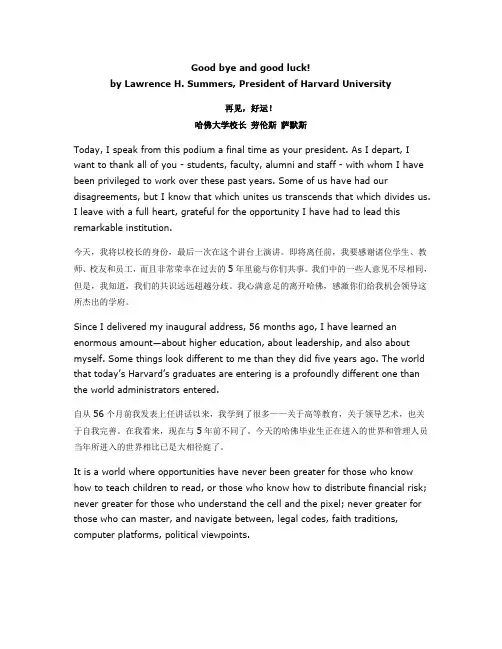
Good bye and good luck!by Lawrence H. Summers, President of Harvard University再见,好运!哈佛大学校长劳伦斯萨默斯Today, I speak from this podium a final time as your president. As I depart, I want to thank all of you - students, faculty, alumni and staff - with whom I have been privileged to work over these past years. Some of us have had our disagreements, but I know that which unites us transcends that which divides us.I leave with a full heart, grateful for the opportunity I have had to lead this remarkable institution.今天,我将以校长的身份,最后一次在这个讲台上演讲。
即将离任前,我要感谢诸位学生、教师、校友和员工,而且非常荣幸在过去的5年里能与你们共事。
我们中的一些人意见不尽相同,但是,我知道,我们的共识远远超越分歧。
我心满意足的离开哈佛,感激你们给我机会领导这所杰出的学府。
Since I delivered my inaugural address, 56 months ago, I have learned an enormous amount—about higher education, about leadership, and also about myself. Some things look different to me than they did five years ago. The world that today’s Harvard’s graduates are entering is a profoundly different one than the world administrators entered.自从56个月前我发表上任讲话以来,我学到了很多——关于高等教育,关于领导艺术,也关于自我完善。

何江哈佛演讲视频附双语全文近日,哈佛毕业典礼上迎来了一位特殊的学生代表演讲人,他就是一名来自湖南农村的哈佛生物系博士毕业生何江。
何江在毕业典礼上是作为研究生优秀毕业生的代表发表演讲,哈佛校方确认他是第一位享此殊荣的中国大陆学生。
当天,与他同台演讲的特邀嘉宾是著名导演史蒂芬·斯皮尔伯格。
何江1988年出生于湖南省长沙市宁乡县南田坪乡停钟村的一户农民家中。
这位在中国湖南农村长大、上大学才第一次进城的中国学生,家里经济条件一般,母亲甚至不识字。
但凭借自己的努力,何江本科在中国科技大学获得了最高荣誉奖——郭沫若奖学金,随后他进入哈佛大学硕博连读,毕业后将赴麻省理工学院进行博士后研究。
我们现在就来看看何江在哈佛毕业典礼上的演讲↓↓双语对照文本:The Spider’s Bite蜘蛛的叮咬When I was in middle school, a poisonous spider bit my right hand. I ran to my mom for help—but instead of taking me to a doctor, my mom set my hand on fire.我在读初中的时候,曾被一只毒蜘蛛咬伤了右手。
我跑去求助母亲。
她没带我去看医生,却在我的手上放了一把火。
After wrapping my hand with several layers of cotton, then soaking it in wine, she put a chopstick into my mouth, and ignited the cotton. Heat quickly penetrated the cotton and began to roast my hand. The searing pain made me want to scream, but the chopstick prevented it.All I could do was watch my hand burn - one minute, then two minutes –until mom put out the fire.在我的手上包了几层棉纱,用白酒浸湿后,她往我嘴里放了一根筷子,然后点燃了棉纱。
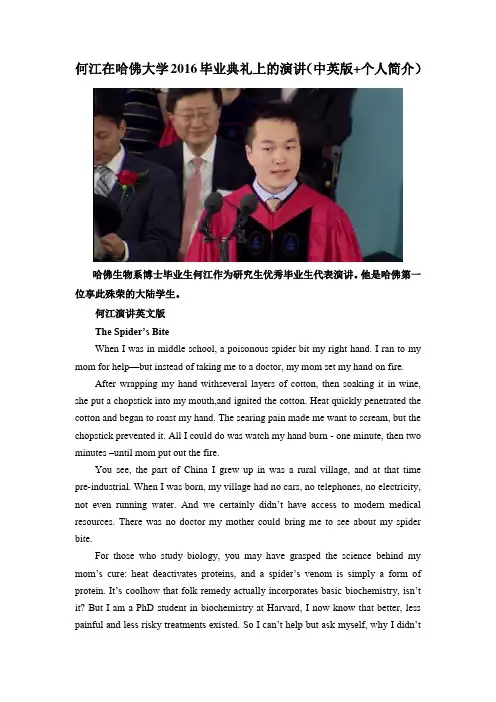
何江在哈佛大学2016毕业典礼上的演讲(中英版+个人简介)哈佛生物系博士毕业生何江作为研究生优秀毕业生代表演讲。
他是哈佛第一位享此殊荣的大陆学生。
何江演讲英文版The Spider’s BiteWhen I was in middle school, a poisonous spider bit my right hand. I ran to my mom for help—but instead of taking me to a doctor, my mom set my hand on fire.After wrapping my hand withseveral layers of cotton, then soaking it in wine, she put a chopstick into my mouth,and ignited the cotton. Heat quickly penetrated the cotton and began to roast my hand. The searing pain made me want to scream, but the chopstick prevented it. All I could do was watch my hand burn - one minute, then two minutes –until mom put out the fire.You see, the part of China I grew up in was a rural village, and at that time pre-industrial. When I was born, my village had no cars, no telephones, no electricity, not even running water. And we certainly didn’t have access to modern medical resources. There was no doctor my mother could bring me to see about my spider bite.For those who study biology, you may have grasped the science behind my mom’s cure: heat deactivates proteins, and a spider’s venom is simply a form of protein. It’s coolhow that folk remedy actually incorporates basic biochemistry, isn’t it? But I am a PhD student in biochemistry at Harvard, I now know that better, less painful and less risky treatments existed. So I can’t help but ask myself, why I didn’treceive oneat the time?Fifteen years have passed since that incident. I am happy to report that my hand is fine. But this question lingers, and I continue to be troubled by the unequal distribution of scientific knowledge throughout the world. We have learned to edit the human genome and unlock many secrets of how cancer progresses. We can manipulate neuronal activity literally with the switch of a light. Each year brings more advances in biomedical research-exciting, transformative accomplishments. Yet, despite the knowledge we have amassed, we haven’t been so successful in deploying it to where it’s needed most. According to the World Bank, twelve percent of the world’s population lives on less than $2 a day. Malnutrition kills more than 3 million children annually. Three hundred million peopleare afflicted by malaria globally. All over the world, we constantly see these problems of poverty, illness, and lack of resources impeding the flow of scientific information. Lifesaving knowledge we take for granted in the modern world is often unavailable in these underdeveloped regions.And in far too many places, people are still essentially trying to cure a spider bite with fire.While studying at Harvard, I saw how scientific knowledge can help others in simple, yet profound ways. The bird flu pandemic in the 2000s looked to my village like a spell cast by demons. Our folk medicine didn’t even have half-measures to offer. What’s more, farmers didn’t know the difference between common cold and flu; they didn’t understand that the flu was much more lethal than the common cold. Most people were also unaware that the virus could transmit across different species.So when I realized that simple hygiene practices like separating different animal species could contain the spread of the disease, and that I could help make this knowledge available to my village, that was my first “Aha” moment as a budding scientist. But it was more than that: it was also a vital inflection point in my own ethical development, my own self-understanding as a member of the global community.Harvard dares us to dream big, to aspire to change the world. Here on this Commencement Day, we are probably thinking of grand destinations and big adventures that await us. As for me, I am also thinking of the farmers in my village. My experiencehere reminds me how important it is for researchersto communicateour knowledge to those who need it. Because by using the sciencewe already have, wecould probably bring my village and thousands like it into the world you and I take for granted every day. And that’s an impact every one of us can make!But the question is, will we make the effort or not?More than ever before,our society emphasizes science and innovation. But an equally important emphasis should be on distributing the knowledge we have to where it’s needed. Changing the world doesn’t mean thateveryone has to find the next big thing. It can be as simple as becoming better communicators, and finding more creative ways to pass on the knowledge we have to people like my mom and the farmers in their local community. Our society also needs to recognize that the equal distribution of knowledge is a pivotal step of human development, and work to bring this into reality.And if we do that, then perhaps a teenager in rural China who is bitten by a spider will not have to burn his hand, but will know to seek a doctor instead.在我读初中的时候,有一次,一只毒蜘蛛咬伤了我的右手。
![比尔·盖茨在哈佛大学毕业典礼上的演讲(中英文对照)[精选5篇]](https://uimg.taocdn.com/bfeec3f05122aaea998fcc22bcd126fff7055ddb.webp)
比尔·盖茨在哈佛大学毕业典礼上的演讲(中英文对照)[精选5篇]第一篇:比尔·盖茨在哈佛大学毕业典礼上的演讲(中英文对照) 比尔·盖茨和夫人梅琳达·盖茨在斯坦福大学2014年毕业典礼上的演讲。
整个演讲以“乐观”为主线,强调了他们对科技的乐观态度,以及对世界美好未来的乐观态度。
盖茨夫妇轮流讲述了自己的亲身经历和故事,告诉学生应该站在他人的立场上,感同身受那些处境不及自己的人,尽自己所能去帮助那些需要帮助的人,让全世界所有人类同胞都有一样的美好未来。
Stanford University.(斯坦福大学)BILL GATES: Congratulations, class of 2014!比尔·盖茨:2014届毕业生,祝贺你们顺利毕业(Cheers).(欢呼)Melinda and I are excited to be here.It would be a thrill for anyone to be invited to speak at a Stanford commencement, but it's especially gratifying for us.Stanford is rapidly becoming the favorite university for members of our family, and it's long been a favorite university for Microsoft and our foundation.我和梅琳达怀着激动的心情与你们欢聚在此共贺毕业。
能受邀到斯坦福大学学位授予典礼上做演讲是一件让人激动的事,对我们而言,这尤为荣幸。
斯坦福大学正日渐成为我们家庭成员最喜爱的大学。
而长久以来,斯坦福也是微软以及比尔与梅琳达基金会最喜爱的一所大学。
”Our formula has been to get the smartest, most creative people working on the most important problems.It turns out that a disproportionate number of those people are at Stanford.(Cheers).我们一直致力于让最聪颖有创造力的人攻克最为重要的问题。
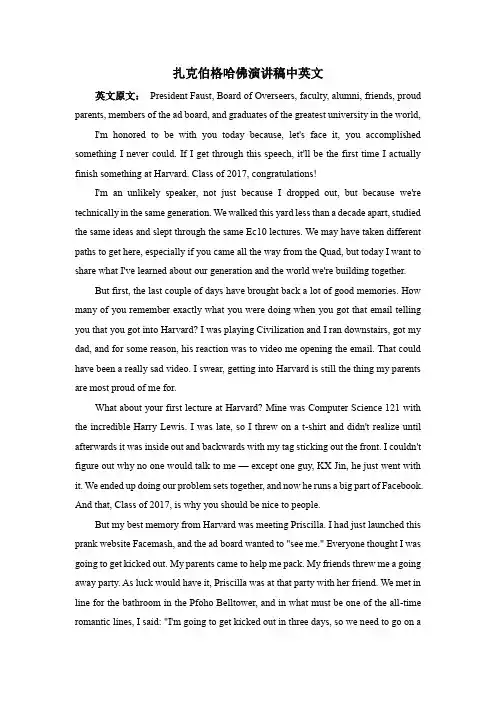
扎克伯格哈佛演讲稿中英文英文原文:President Faust, Board of Overseers, faculty, alumni, friends, proud parents, members of the ad board, and graduates of the greatest university in the world, I'm honored to be with you today because, let's face it, you accomplished something I never could. If I get through this speech, it'll be the first time I actually finish something at Harvard. Class of 2017, congratulations!I'm an unlikely speaker, not just because I dropped out, but because we're technically in the same generation. We walked this yard less than a decade apart, studied the same ideas and slept through the same Ec10 lectures. We may have taken different paths to get here, especially if you came all the way from the Quad, but today I want to share what I've learned about our generation and the world we're building together.But first, the last couple of days have brought back a lot of good memories. How many of you remember exactly what you were doing when you got that email telling you that you got into Harvard? I was playing Civilization and I ran downstairs, got my dad, and for some reason, his reaction was to video me opening the email. That could have been a really sad video. I swear, getting into Harvard is still the thing my parents are most proud of me for.What about your first lecture at Harvard? Mine was Computer Science 121 with the incredible Harry Lewis. I was late, so I threw on a t-shirt and didn't realize until afterwards it was inside out and backwards with my tag sticking out the front. I couldn't figure out why no one would talk to me — except one guy, KX Jin, he just went with it. We ended up doing our problem sets together, and now he runs a big part of Facebook. And that, Class of 2017, is why you should be nice to people.But my best memory from Harvard was meeting Priscilla. I had just launched this prank website Facemash, and the ad board wanted to "see me." Everyone thought I was going to get kicked out. My parents came to help me pack. My friends threw me a going away party. As luck would have it, Priscilla was at that party with her friend. We met in line for the bathroom in the Pfoho Belltower, and in what must be one of the all-time romantic lines, I said: "I'm going to get kicked out in three days, so we need to go on adate quickly."Actually, any of you graduating can use that line.Today I want to talk about three ways to create a world where everyone has a sense of purpose: by taking on big meaningful projects together, by redefining equality so everyone has the freedom to pursue purpose and by building community across the world.First, let's take on big meaningful projects. Our generation will have to deal with tens of millions of jobs replaced by automation like self-driving cars and trucks. But we have the potential to do so much more together. Every generation has its defining works. More than 300,000 people worked to put a man on the moon – including that janitor. Millions of volunteers immunized children around the world against polio. Millions of more people built the Hoover dam and other great projects.These projects didn't just provide purpose for the people doing those jobs, they gave our whole country a sense of pride that we could do great things.Now it's our turn to do great things. I know, you're probably thinking: I don't know how to build a dam, or get a million people involved in anything.But let me tell you a secret: no one does when they begin. Ideas don't come out fully formed. They only become clear as you work on them. You just have to get started.If I had to understand everything about connecting people before I began, I never would have started Facebook.Movies and pop culture get this all wrong. The idea of a single eureka moment is a dangerous lie. It makes us feel inadequate since we haven't had ours. It prevents people with seeds of good ideas from getting started. Oh, you know what else movies get wrong about innovation? No one writes math formulas on glass. That's not a thing.It's good to be idealistic. But be prepared to be misunderstood. Anyone working on a big vision will get called crazy, even if you end up right. Anyone working on a complex problem will get blamed for not fully understanding the challenge, even though it's impossible to know everything upfront. Anyone taking initiative will get criticized for moving too fast, because there's always someone who wants to slow you down.But if you know what you're sure about, if you know what you want to build, then you must be bold and be committed to it. You'll make mistakes. It's tough, but it's a part of being bold. You'll make mistakes, but you'll learn from them, and that's the best way to build something great.中文翻译:福斯特校长、监事会成员、老师、校友、朋友们、自豪的家长们、管理委员会的委员们,以及全世界最伟大学校的毕业生们,今天和你们在一起我感到非常荣幸,因为,说实话,你们完成了一个我永远无法完成的成就。
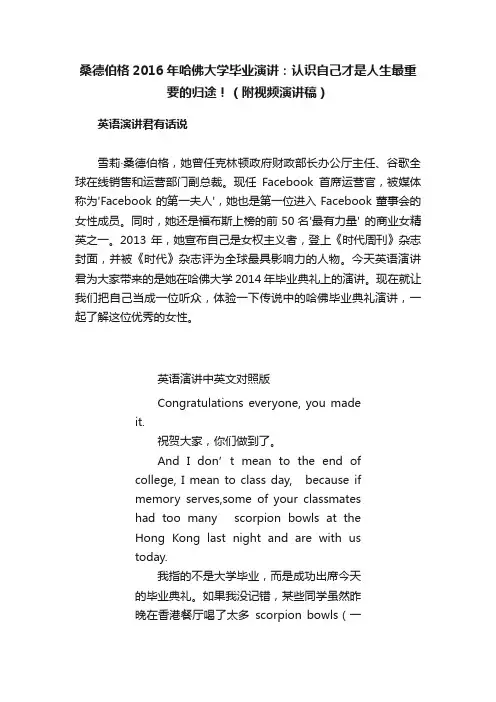
桑德伯格2016年哈佛大学毕业演讲:认识自己才是人生最重要的归途!(附视频演讲稿)英语演讲君有话说雪莉·桑德伯格,她曾任克林顿政府财政部长办公厅主任、谷歌全球在线销售和运营部门副总裁。
现任Facebook首席运营官,被媒体称为'Facebook的第一夫人',她也是第一位进入Facebook董事会的女性成员。
同时,她还是福布斯上榜的前50名'最有力量' 的商业女精英之一。
2013年,她宣布自己是女权主义者,登上《时代周刊》杂志封面,并被《时代》杂志评为全球最具影响力的人物。
今天英语演讲君为大家带来的是她在哈佛大学2014年毕业典礼上的演讲。
现在就让我们把自己当成一位听众,体验一下传说中的哈佛毕业典礼演讲,一起了解这位优秀的女性。
英语演讲中英文对照版Congratulations everyone, you madeit.祝贺大家,你们做到了。
And I don’t mean to the end ofcollege, I mean to class day, because ifmemory serves,some of your classmateshad too many scorpion bowls at theHong Kong last night and are with ustoday.我指的不是大学毕业,而是成功出席今天的毕业典礼。
如果我没记错,某些同学虽然昨晚在香港餐厅喝了太多scorpion bowls(一种鸡尾酒),但今天还是来了。
Congratulations to your parents.You have spent a lot of money, so your child can say she went to a “small school” near Boston. And thank you to the class of 2014 for inviting me to the part of your celebration. It means a great to me. And looking at the list of past speakers was a little d aunting.I can’t be as funny as Amy Poehler, but I’m gonna be funnier than Mother Teresa.祝贺你们的家长,你们花了很多钱,让子女能够说自己是从波士顿附近的这所“小学校“毕业的。
比尔盖茨哈佛演讲中英第一篇:比尔盖茨哈佛演讲中英Should Harvard encourage its faculty to take on the world’s worst inequities? Should Harvard students learn about the depth of global poverty … the prevalence of world hunger … the scarcity of clean water …the girls kept out of school the children who die from diseases we can cure?哈佛是否应该鼓励教授解决世界上存在的严重不平等?哈佛的学生是不是应该多关注一些全球贫富不均、粮食短缺、水资源稀缺、女童辍学的问题?以及那些因无法接受有效治疗而死亡的孩子?Should the world’s most privileged people learn about the lives of the world’s least privileged?世界上最衣食无忧的人是否应该了解那些挣扎在死亡边缘的人们的生活?These are not rhetorical questions – you will answer with your policies.这并非言语修辞,这些问题只能用行动回答。
My mother, who was filled with pride the day I was admitted here – never stopped pressing me to do more for others.A few days before my wedding, she hosted a bridal event, at which she read aloud a letter about marriage that she had written to Melinda.My mother was very ill with cancer at the time, but she saw one more opportunity to deliver her message, and at the close of the letter she said: ―From those to whom much is given, much is expected.‖我的母亲一直为我考上哈佛而自豪,也一直督促我回报社会。
比尔盖茨哈佛大学中英对照演讲稿比尔盖茨哈佛大学中英对照演讲稿比尔盖茨哈佛大学中英对照演讲稿President Bok, former President Rudenstine, incoming President Faust, members of the Harvard Corporation and the Board of Overseers, members of the faculty, parents, and especially, the graduates:尊敬的Bok校长,Rudenstine前校长,即将上任的Faust校长,哈佛集团的各位成员,监管理事会的各位理事,各位老师,各位家长,各位同学:I’ve been waiting more than 30 years to say this: "Dad, I always told you I’d come back and get my degree."有一句话我等了三十年,现在终于可以说了:“老爸,我总是跟你说,我会回来拿到我的学位的!”I want to thank Harvard for this timely honor. I’ll be changing my job next year … and it will be nice to finally have a college degree on my resume.我要感谢哈佛大学在这个时候给我这个荣誉。
明年,我就要换工作了(注:指从微软公司退休)……我终于可以在简历上写我有一个本科学位,这真是不错啊。
I applaud the graduates today for taking a much more direct route to your degrees. For my part, I’m just happy that the Crimson has called me "Harvard’s most successful dropout." I guess that makes me valedictorian of my own special class (I)did the best of everyone who failed.我为今天在座的各位同学感到高兴,你们拿到学位可比我简单多了。
2016年,哈佛,毕业演讲英文稿欢迎来到演讲稿栏目,本文为大家带来《2016年,哈佛,毕业演讲英文稿》,希望能帮助到你。
何江在哈佛大学2016毕业典礼上的演讲(中英版+个人简介)2016年,哈佛,毕业演讲英文稿第一篇何江在哈佛大学2016毕业典礼上的演讲(中英版+个人简介)哈佛生物系博士毕业生何江作为研究生优秀毕业生代表演讲。
他是哈佛第一位享此殊荣的大陆学生。
何江演讲英文版The Spider’s BiteWhen I was in middle school, a poisonous spider bit my right hand. I ran to my mom for help—but instead of taking me to a doctor, my mom set my hand on fire. After wrapping my hand withseveral layers of cotton, then soaking it in wine, she put a chopstick into my mouth,and ignited the cotton. Heat quickly penetrated the cotton and began to roast my hand. The searing pain made me want to scream, but the chopstick prevented it. All I could do was watch my hand burn - one minute, then two minutes –until mom put out the fire.You see, the part of China I grew up in was a rural village, and at that time pre-industrial. When I was born, my village had no cars, no telephones, no electricity, not even running water. And we certainly didn’t have access to modern medical resources. There was no doctor my mother could bring me to seeabout my spider bite.For those who study biology, you may have grasped the science behind my mom’s cure: heat deactivates proteins, and a spider’s venom is simply a form of protein. It’s coolhow that folk remedy actually incorporates basic biochemistry, isn’t it? But I am a PhD student in biochemistry at Harvard, I now know that better, less painful and less risky treatments existed. So I can’t help but ask myself, why I didn’treceive oneat the time?Fifteen years have passed since that incident. I am happy to report that my hand is fine. But this question lingers, and I continue to be troubled by the unequal distribution of scientific knowledge throughout the world. We have learned to edit the human genome and unlock many secrets of how cancer progresses. We can manipulate neuronal activity literally with the switch of a light. Each year brings more advances in biomedical research-exciting, transformative accomplishments. Yet, despite the knowledge we have amassed, we haven’t been so successful in deploying it to where it’s needed most. According to the World Bank, twelve percent of the world’s population lives on less than $2 a day. Malnutrition kills more than 3 million children annually. Three hundred million peopleare afflicted by malaria globally. All over the world, we constantly see these problems of poverty, illness, and lack of resources impeding the flow of scientific information. Lifesaving knowledge we take for granted in themodern world is often unavailable in these underdeveloped regions.And in far too many places, people are still essentially trying to cure a spider bite with fire.While studying at Harvard, I saw how scientific knowledge can help others in simple, yet profound ways. The bird flu pandemic in the 2000s looked to my village like a spell cast by demons. Our folk medicine didn’t even have half-measures to offer. What’s more, farmers didn’t know the difference between common cold and flu; they didn’t understand that the flu was much more lethal than the common cold. Most people were also unaware that the virus could transmit across different species. So when I realized that simple hygiene practices like separating different animal species could contain the spread of the disease, and that I could help make this knowledge available to my village, that was my first ―Aha‖moment as a budding scientist. But it was more than that: it was also a vital inflection point in my own ethical development, my own self-understanding as a member of the global community.Harvard dares us to dream big, to aspire to change the world. Here on this Commencement Day, we are probably thinking of grand destinations and big adventures that await us. As for me, I am also thinking of the farmers in my village. My experiencehere reminds me how important it is for researchersto communicateour knowledge to those who need it. Because by using the sciencewe already have, wecould probably bring my village and thousands like it into the world you and I take for granted every day. And that’s an impact every one of us can make!But the question is, will we make the effort or not?More than ever before,our society emphasizes science and innovation. But an equally important emphasis should be on distributing the knowledge we have to where it’s needed. Changing the world doesn’t mean thateveryone has to find the next big thing. It can be as simple as becoming better communicators, and finding more creative ways to pass on the knowledge we have to people like my mom and the farmers in their local community. Our society also needs to recognize that the equal distribution of knowledge is a pivotal step of human development,and work to bring this into reality.And if we do that, then perhaps a teenager in rural China who is bitten by a spider will not have to burn his hand, but will know to seek a doctor instead.在我读初中的时候,有一次,一只毒蜘蛛咬伤了我的右手。
何江的演讲第一篇:何江的演讲2016年5月26日,在湖南农村长大、上大学才第一次进城的中国小伙儿何江,成为首位在哈佛毕业典礼上演讲的华人学子。
何江是首位在哈佛毕业典礼上演讲的华人学子在毕业典礼上演讲,相当于哈佛大学给予毕业生的最高荣誉——从全校数万名毕业生中各选出一名本科生和研究生,代表毕业生发言。
何江演讲的题目是《蜘蛛咬伤轶事》(The Spider‟s Bite)。
他以自己幼年时在中国农村被蜘蛛咬伤,母亲用传统土法治疗的故事为引,解释了自己的科研意义:“作为世界不同地区的沟通者,并找出更多创造性的方法将知识传递给像我母亲或农民这样的群体。
同时,改变世界也意味着我们的社会,作为一个整体,能够更清醒的认识到科技知识的更加均衡的分布,是人类社会发展的一个关键环节,而我们也能够一起奋斗将此目标变成现实。
”在演讲最后,何江用中文说:“谢谢。
”何江在哈佛毕业典礼上演讲,左边是另一位演讲嘉宾、导演斯皮尔伯格据中青在线报道,26日,中国留美学生何江作为哈佛研究生优秀毕业生代表发言。
这相当于哈佛大学给予毕业生的最高荣誉——从全校数万名毕业生中各选出一名本科生和研究生,代表毕业生发言。
哈佛校方确认该校生物系博士毕业生何江是第一位享此殊荣的华人学生。
当天,与他同台演讲的特邀嘉宾将是著名导演史蒂芬·斯皮尔伯格。
这不是他第一次获得一所大学毕业生的最高荣誉。
何江曾经获得中国科学技术大学本科生最高荣誉奖——郭沫若奖学金,并作为获奖代表发言。
“现在乡村逐渐流行读书无用论,认为寒门很难再出贵子。
这样的观点让我觉得挺无奈的。
”何江在接受记者采访后,特地用短信方式再次补充自己的观点,“教育能够改变一个人的生活轨迹,能够把一个人从一个世界带到另一个不同的世界。
我希望我的成长经历,能给那些还在路上的农村学生一点鼓励,让他们看到坚持的希望。
”再苦再穷也不让儿子成为“留守儿童”上世纪80年代的湖南农村,像当时中国所有的农村一样,以土坯房为主,孩子的零食以糖水为主。
斯皮尔伯格英语演讲Captivating the audience with his signature storytelling prowess, Steven Spielberg, the legendary filmmaker, delivered an English speech that was nothing short of a cinematic masterpiece. His words, woven with the threads of passion and experience, painted a vivid picture of the power of cinema to transcend cultural barriers and unite humanity. With eloquence and a touch of humor, Spielberg recounted his journey from a young dreamer with a camera to the master of the silver screen, inspiring a new generation of filmmakers to chase their dreams with relentless vigor.He spoke of the transformative power of storytelling, how it can ignite the imagination, provoke thought, and even incite change. Spielberg emphasized the importance of diversity in storytelling, celebrating the richness that comes from different voices and perspectives. His speech was a testament to the enduring legacy of cinema, a medium that continues to evolve yet remains a beacon of hope and a window into the human experience.In his address, Spielberg also touched upon the challenges faced by the industry, from technological disruptions to the ever-changing landscape of audience preferences. He urged his peers to embrace change, to innovate, and to never lose sight of the core values that make storytelling an art form with the power to move hearts and minds.With a nod to the future, Spielberg's speech was a call to action for filmmakers to create content that not only entertains but also enlightens, to tell stories that reflect the complexities of our world and the shared humanity that binds us all. His words resonated with the audience, leaving them with a renewed appreciation for the magic of cinema and the storytellers who bring it to life.。
Steven Spielberg's Harvard University 2016 Commencement Address May 26, 2016斯皮尔伯格哈佛大学毕业典礼演讲2016-5-26Speak up when you disagree with the voice of authority。
演讲主题:倾听内心的低语。
(或听从内心,追随直觉)Thank you, thank you, President Faust, and Paul Choi, thank you so much.非常感谢Faust校长、Paul Choi校长谢谢你们。
It's an honor and a thrill to address this group of distinguished alumni and supportive friends and kvelling parents. We've all gathered to share in the joy of this day, so please join me in congratulating Harvard's Class of 2016.非常荣幸能被邀请成为哈佛2016年毕业典礼的演讲嘉宾,在众位优秀的毕业生、热情的朋友和诸位家长前做演讲。
今天让我们一起,祝贺2016届哈佛毕业生顺利毕业。
I can remember my own college graduation, which is easy, since it was only 14 years ago. How many of you took 37 years to graduate? Because, like most of you, I began college in my teens, but sophomore year, I was offered my dream job at Universal Studios, so I dropped out. I told my parents if my movie career didn't go well, I'd re-enroll.我记得我自己的大学毕业典礼,这不难,因为就是14年以前的事情。
你们当中的多少人花了37年才毕业?因为就像你们中的多数人,我在十几岁时进入大学,但是大二的时候我从环球影城获得了我的梦想工作,所以我休学了。
我跟我的父母说,如果我的电影事业不顺,我会重新上学的。
It went all right.我的电影事业发展得还行。
But eventually/finally, I returned for one big reason. Most people go to college for an education, and some go for their parents, but I went for my kids. I'm the father of seven, and I kept insisting on the importance of going to college, but I hadn't walked the walk. So, in my fifties, I re-enrolled at Cal State - Long Beach, and I earned my degree.但是我最后还是回到了学校,主要为了一个原因。
很多人为了获得教育去上大学,有的人为了父母上大学,而我是为了我的孩子去上的。
我是7个孩子的爸爸,我总是不断强调上大学的重要性,可我自己都没上过。
所以在我50多岁的时候,我重新进入加州州立大学长滩分校,获得了学位。
I just have to add: It helped that they gave me course credit in paleontology for the work I did on Jurassic Park. That's three units for Jurassic Park, thank you.我必须补充一点,我获得学位的一个原因是学校为我在《侏罗纪公园》里所做的,给我了考古学学分。
《侏罗纪公园》换得了3个学分,非常感谢。
Well, I left college because I knew exactly what I wanted to do, and some of you know, too - but some of you don't. Or maybe you thought you knew but are now questioning that choice. Maybe you're sitting there trying to figure out how to tell your parents that you want to be a doctor and not a comedy writer.我离开大学是因为我很清楚地知道我想要做什么。
你们中的一些人也知道,但是有些人还没弄明白。
或者你以为你知道,但是现在开始质疑这个决定。
或者你坐在这里,试着想要怎么告诉你的父母,你想要成为一名医生,而不是喜剧编剧。
Well, what you choose to do next is what we call in the movies the 'character-defining moment.' Now, these are moments you're very familiar with, like in the last Star Wars: The Force Awakens, when Reyrealizes the force is with her. Or Indiana Jones choosing mission over fear by jumping over a pile of snakes.你接下来要做的事情,在我们这行叫做“定义角色的时刻”。
这些是你非常熟悉的场景,例如在最近的一部《星球大战:原力觉醒》里女主角Rey发现自己拥有原力的一刻。
或者在《夺宝奇兵》里印第安纳·琼斯选择战胜恐惧跳过蛇堆,继续任务的时候。
Now in a two-hour movie, you get a handful of character-defining moments, but in real life, you face them every day. Life is one strong, long string of character-defining moments. And I was lucky that at 18 I knew what I exactly wanted to do. But I didn't know who I was. How could I? And how could any of us? Because for the first 25 years of our lives, we are trained to listen to voices that are not our own. Parents and professors fill our heads with wisdom and information, and then employers and mentors take their place and explain how this world really works.一部两小时的电影里有几个定义角色的时刻,但是在真实的生活中,你每天都在面对这样的时刻。
生活就是一长串强大的定义角色的时刻。
我非常幸运在18岁时就知道我想要做什么。
但是我并不知道我是谁。
我怎么可能知道呢?我们中任何人都不知道。
因为在生命的头一个25年里,我们被训练去倾听除自己以外的人的声音。
父母和教授们把智慧和信息塞进我们的脑袋,然后换上雇主和导师来向我们解释这个世界到底是怎么一回事。
And usually these voices of authority make sense, but sometimes, doubt starts to creep into our heads and into our hearts. And even when we think, 'that's not quite how I see the world,' it's kind of easier to just to nod in agreement and go along, and for a while, I let that going along define my character. Because I was repressing my own point of view, because like in that Nilsson song, 'Everybody was talkin' at me, so I couldn't hear the echoes of my mind.'通常这些权威人物的声音是有道理的,但是有些时候,质疑会爬进你的脑子和心里。
就算我们觉得“这好像不太是我看世界的方式”,点头表示赞同也是更容易做的事情,有段时间我就让“附和”定义了我。
因为我压抑了自己的想法,因为就像尼尔森歌里唱的一样:“每个人都在对我说话,所以我听不见我思考的回声。
”And at first, the internal voice I needed to listen to was hardly audible, and it was hardly noticeable - kind of like me in high school. But then I started paying more attention, and my intuition kicked in.一开始,我需要倾听的内心的声音几乎一声不响,也难以察觉——就像高中时的我。
但是之后我开始更加注意这些声音,然后我的直觉开始工作。
And I want to be clear that your intuition is different from your conscience. They work in tandem, but here's the distinction: Your conscience shouts, 'here's what you should do,' while your intuition whispers, 'here's what you could do.' Listen to that voice that tells you what you could do. Nothing will define your character more than that.我想告诉你,你的直觉和你的良心是两个不同的事物。